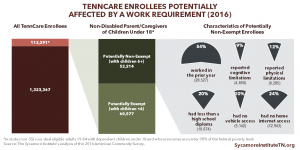
Supporters and opponents of a proposed TennCare work requirement have disagreed about who would be exempt. This post attempts to bring some clarity to that debate. The bill (HB1551/SB1728) has passed the Tennessee House of Representatives and is currently pending in the Senate.
Key Takeaways
- As currently written, HB1551/SB1728 and federal guidance specify some exemptions to a proposed TennCare work requirement.
- If the bill becomes law, federal guidance and programs approved in 3 other states suggest that TennCare would have significant flexibility to negotiate additional details with the federal government.
- If legislators want to give TennCare either more or less flexibility, possible methods include amending the bill or using debate time to establish legislative intent.
As highlighted in our previous research, a work requirement could help encourage self-sufficiency but could also have unintended consequences, such as the loss of health coverage for reasons policymakers do not intend. The details about exemptions (as well as compliance and monitoring) will define the scope of TennCare enrollees who feel an effect from the proposed work requirement.
Summary of Exemptions in Tennessee & Other States
The table below compares select exemptions to Medicaid work requirements as required by federal guidance, proposed in Tennessee, and approved in 3 states as of March 27, 2018.
Pending legislation says Tennessee’s plan “shall be consistent with the most recent guidance” from the federal Centers for Medicare & Medicaid Services (CMS). Keep in mind that the guidance could change at CMS’ discretion (it is neither law nor regulation).
Any exemptions not specifically required by the guidance or legislation would presumably be determined during TennCare’s waiver negotiations with CMS.
Examples of Medicaid Work Requirement Exemptions in Tennessee & Other States
| Exemption Categories | CMS Guidance | Tennessee (Proposed) | Kentucky (Approved) | Indiana (Approved) | Arkansas (Approved) |
|---|---|---|---|---|---|
| Non-expansion populations1 | does not specify | N/A Tennessee has not expanded Medicaid | not exempt | not exempt | EXEMPT applies only to expansion pop. |
| Seniors | EXEMPT but age range not defined | EXEMPT only applies to “working age adults” | EXEMPT age 65+ | EXEMPT age 60+ | EXEMPT age 50+ |
| Eligible for Medicaid due to disability | EXEMPT | EXEMPT “shall be consistent” with CMS guidance | EXEMPT | EXEMPT | EXEMPT |
| Pregnant women | EXEMPT | EXEMPT “shall be consistent” with CMS guidance | EXEMPT | EXEMPT | EXEMPT pregnant and 60 days post-partum |
| Parents or caregivers of dependent children | noted for consideration but not required | EXEMPT individuals with dependents under 6 | EXEMPT primary caregivers (1 per household) of a dependent minor | EXEMPT primary caregivers of dependent children below compulsory education age | EXEMPT individuals who live in a home with dependent children under 18 |
| Other caregivers | noted for consideration but not required | TBD | EXEMPT primary caregivers (1 per household) of adults with disability | EXEMPT primary caregivers of dependents with disability | EXEMPT individuals caring for an incapacitated person |
| Other individuals with a disability | requires a plan to comply with federal disability rights laws | TBD “shall be consistent” with CMS guidance | ? may qualify under other exemptions | EXEMPT those unable to meet reqs. due to disability under the ADA | ? may qualify under other exemptions |
| Meets or exempt from TANF & SNAP work reqs. | EXEMPT | EXEMPT “shall be consistent” with CMS guidance | EXEMPT | EXEMPT | EXEMPT |
| Acute condition prevents compliance (per a doctor) | EXEMPT | EXEMPT “shall be consistent” with CMS guidance | EXEMPT | EXEMPT | EXEMPT |
| Medically frail | EXEMPT | EXEMPT “shall be consistent” with CMS guidance | EXEMPT | EXEMPT | EXEMPT |
| Individuals with a substance use disorder (SUD) | requires a plan to exempt or modify reqs. for those with SUD to ensure access to treatment | TBD “shall be consistent” with CMS guidance | participation in drug treatment counts as a qualifying work activity | EXEMPT individuals in active treatment, others may qualify under other exemptions | ? may qualify under other exemptions |
| Victims of domestic violence | noted for consideration but not required | TBD | not exempt | EXEMPT | not exempt |
| Students | noted for consideration but not required | TBD | EXEMPT full-time | EXEMPT full- and part-time | EXEMPT full-time |
| Exemption Categories | CMS Guidance | Tennessee (Proposed) | Kentucky (Approved) | Indiana (Approved) | Arkansas (Approved) |
1 The Affordable Care Act (ACA) allows states to expand Medicaid eligibility to all adults under 138% of poverty. Newly eligible enrollees are known as the “expansion population.” Traditional (or non-expansion) enrollees generally must fall into a covered category (e.g. parent or caretaker relative).
More details on these and other exemptions are available below and in the Supplemental Tables.* Individuals who are exempt from or deemed to be in compliance may also have to prove that status to TennCare.
What Federal Guidance Currently Requires
Guidance released by CMS in January 2018 provided the first details on how states could design a Medicaid work requirement. According to the guidance, work requirements may only apply to non-elderly, non-pregnant adult Medicaid enrollees who are eligible for Medicaid on a basis other than disability. (1)
In addition, the guidance requires states to exempt or deem to be in compliance:
- Individuals who are “medically frail” and those with acute conditions that impact their ability to work (certified by a doctor).
- Individuals enrolled in and exempt from or compliant with work requirements for Temporary Assistance for Needy Families (TANF) or the Supplemental Nutrition Assistance Program (SNAP).
States must also give special consideration (exactly how is not defined) to:
- Individuals living in areas with economic or environmental factors that could affect their ability to fulfill work requirements. For example, Tennessee has 19 counties designated as economically distressed.(2)
- Individuals with a substance use disorder. In 2016, the state estimates that opioid use disorder alone was diagnosed in around 2.0% of all TennCare enrollees (about 30,000 individuals). (3)
- Those with other disabilities not already exempt.
The guidance provides dozens of suggestions for other exemptions, modifications, and qualifying activities that states may consider, but these are not required. For examples, states may consider mirroring the exemptions used in TANF/SNAP. (1)
The CMS guidance has not been written into law or regulation and could change at CMS’ discretion. See the Supplemental Tables for more details on requirements and suggestions spelled out in the CMS guidance.*
What The General Assembly’s Proposal Currently Requires
As written, HB1551/SB1728 directs TennCare to pursue work requirements consistent with CMS guidance for able-bodied, working-age adult enrollees without dependent children under 6. The bill also specifies that TennCare’s waiver request to the federal government “shall be consistent with the most recent guidance” from CMS. (4)
The legislation appears to leave TennCare significant room to negotiate the details with CMS. Other than the provisions mentioned above, the bill is silent on who the requirement would apply to, who is exempt, and what would count as work or community engagement.
Legislators could still alter the bill before taking final votes on whether or not to approve it. The bill has passed the House and is currently pending in the Senate.
What Has Been Approved in Other States
Medicaid work requirements that have received federal approval in 3 other states all have unique sets of exemptions and qualifying activities. Each state’s program includes the exemptions required under CMS guidance and lays out a similar set of core qualifying activities, such as employment, training/education, job search, and community service. Beyond that, each state’s specific age parameters, additional exemptions, and additional qualify activities vary considerably. For example, Kentucky’s requirement will apply to adults under 65, while Arkansas’ is limited to adults 50 and under.
- Kentucky’s work requirement will apply to non-disabled, non-pregnant adults ages 19-64. Its exemptions largely mirror only what is required under the guidance. Additional qualifying activities include both drug treatment and caregiving for an individual with a disability. (5)
- Indiana’s work requirement will apply to non-disabled, non-pregnant adults ages 19-59. It includes a number of additional exemptions beyond those required – including for individuals with dependent children under school-age, experiencing homelessness, in drug treatment, with a disability not otherwise exempt, and who are victims of domestic violence. Additional qualifying activities include caregiving for individuals with a disability. (6)
- Arkansas’ work requirement would apply to non-disabled, non-pregnant adults ages 19-50 who are eligible for Medicaid under the Affordable Care Act’s eligibility expansion. It includes a handful of additional exemptions beyond those required – including for individuals who live with dependent children under 18, individuals caring for an incapacitated person, and individuals on unemployment. Additional qualifying activities also include participation in health education classes. (7)
See the Supplemental Tables for more details on the Medicaid work requirements in these 3 states plus New Hampshire.*
Parting Words
The outlines and some specifics of the proposed TennCare work requirement are known, but if the legislation passes, many details about who would be exempt and what activities would count toward the requirement would be determined later. Legislation pending in the General Assembly is silent on many details, although CMS guidance does provide some clarity about exemptions that must be included.
Federal guidance and the programs approved in 3 states suggest that TennCare would have significant flexibility to negotiate the details with CMS. One trade-off of this flexibility is uncertainty about how some TennCare enrollees might be affected. If legislators want to give TennCare more or less flexibility, they could amend HB1551/SB1728 or use debate time to establish legislative intent that would guide TennCare’s negotiations with CMS.
*This post’s Supplemental Tables were updated on July 17, 2018, to include information about New Hampshire’s Medicaid work requirement.
Related Work by The Sycamore Institute
Medicaid Work Requirements in Tennessee
(September – December 2017) A 3-part introductory series.
Digesting the Feds’ New Guidance & 1st Approval of Medicaid Work Requirements
(January 22, 2018) An overview of CMS guidance and Kentucky’s 1115 waiver
6 Insights for the Debate over TennCare Work Requirements
(February 19, 2018) Key insights from our research and analysis on Medicaid work requirements.
TennCare Work Requirements: 4 Things We’ve Learned from Legislative Action
(February 22, 2018) Breaks down lessons we’ve learned from legislative action on work requirements.
References
Click to Open/Close
- U.S. Department of Health and Human Services. RE: Opportunities to Promote Work and Community Engagement Among Medicaid Beneficiaries. Centers for Medicare and Medicaid Services. [Online] January 11, 2018. [Cited: January 12, 2018.] https://www.medicaid.gov/federal-policy-guidance/downloads/smd18002.pdf.
- State of Tennessee. Distressed Counties – 2018. Transparent Tennessee. [Online] [Cited: March 27, 2018.] https://www.tn.gov/transparenttn/jobs-economic-development/openecd/tnecd-performance-metrics/openecd-long-term-objectives-quick-stats/distressed-counties.html.
- Tennessee Division of TennCare. FY 2019 Budget Presentation. [Online] February 2018. https://www.tn.gov/content/dam/tn/tenncare/documents/TennCareBudgetFY19.pdf.
- Assembly, Tennessee General. Amendment #014418 to HB 1551 and SB 1728. [Online] 2018. [Cited: March 26, 2018.] Accessed via http://wapp.capitol.tn.gov/apps/BillInfo/Default.aspx?BillNumber=HB1551.
- U.S. Department of Health and Human Services. Approval Package for Commonwealth of Kentucky’s Section 1115 Demonstration Project. Centers for Medicare and Medicaid Services. [Online] January 12, 2018. [Cited: January 12, 2018.] https://www.medicaid.gov/Medicaid-CHIP-Program-Information/By-Topics/Waivers/1115/downloads/ky/ky-health-ca.pdf.
- —. Approval Package for Indiana’s Section 1115 Demonstration Project. Centers for Medicare and Medicaid Services. [Online] February 1, 2018. [Cited: March 22, 2018.] https://www.in.gov/fssa/hip/files/IN-HIP-1115-Approval-Package_2-1-2018.pdf.
- —. Approval Package for Arkansas’ Section 1115 Demonstration Projects. Centers for Medicare & Medicaid Services. [Online] March 5, 2018. [Cited: March 22, 2018.] https://www.medicaid.gov/Medicaid-CHIP-Program-Information/By-Topics/Waivers/1115/downloads/ar/ar-works-ca.pdf.
Featured Image at top by Jamie Smed / CC BY 2.0
















